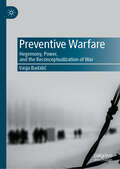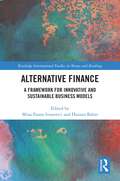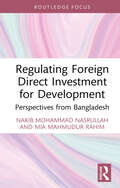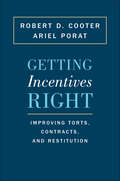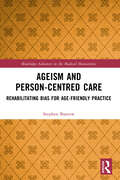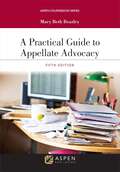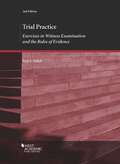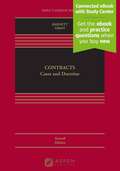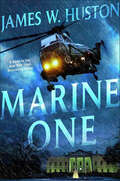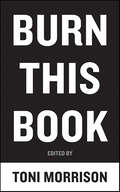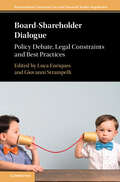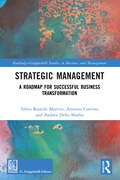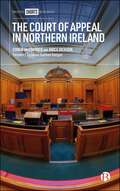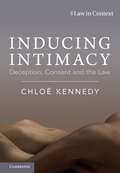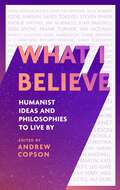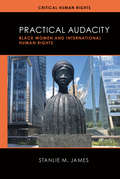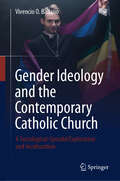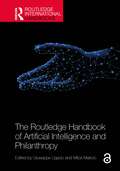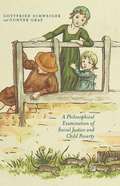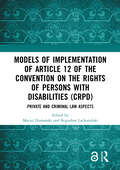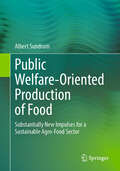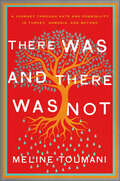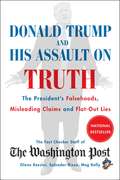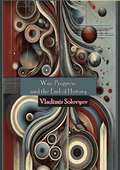- Table View
- List View
Preventive Warfare: Hegemony, Power, and the Reconceptualization of War
by Vasja BadaličThis book provides a critical and comprehensive analysis of the reconceptualization of preventive warfare in the 21st Century. It discusses how the US launched and fought some wars to prevent future vague threats and how that practice has fundamentally undermined the legal system and the main principles of the use of force, in ways that not only further US dominance but shield powerful actors from accountability. The US redefined key legal concepts to set up a new legal framework for preventive warfare and, consequently, introduced new practices for carrying out preventive military operations. Drawing on a collection of case studies, on the changes in the jus ad bellum and jus in bello, focusing mainly on Afghanistan and Iraq and beyond, the book shows how violations of the law of war were persistently conducted in the 21st century by supposedly democratic countries who claimed to be upholding the law. It explores three types of preventive warfare – that is, preventive national self-defense, preventive on-the-spot reactions, and preventive “security” detention – to show how they blurred the line between civilians and legitimate military targets, and thus increased the risk of causing harm to civilians. The book speaks to students, scholars, and practitioners from the fields of criminology, law, international relations, political science, critical security studies, and critical military studies.
Alternative Finance: A Framework for Innovative and Sustainable Business Models (Routledge International Studies in Money and Banking)
by Mina Fanea-Ivanovici Hasnan BaberThe alternative financing space has grown exponentially in the last few decades, namely as a consequence of the financial crisis, technological advancement, niche customer segments, and more recently the pandemic. Now, with the inclusion of Fintech, online lenders, crowdfunding, accelerators, venture capitalists, or angel investors, this funding channel is no longer seen as a substitute for formal financing, but rather a core one. This book is a comprehensive guide to alternative financing methods, offering insights into emerging trends, the role of FinTech, and the intersection of finance with sustainability, innovation, and entrepreneurship.It fills a knowledge gap by exploring innovative financing channels such as fintech, green finance, and venture capital as well as other non-traditional ways of raising funds, which have become crucial for startups and businesses. It discusses the impact of financial technology (FinTech) on these methods and their function in supporting entrepreneurship and sustainable business, while also examining the implications of these technological advancements in the wider financial sector. It addresses challenges and opportunities for entrepreneurs and explores how alternative financing options can support growth and innovation, particularly in the context of environmentally and socially focused ventures, including how to integrate economic, social, and environmental considerations. The emphasis on sustainability and green finance aligns with the growing global concern for responsible business practices and the Sustainable Development Goals.While the primary audience for the book is scholars, researchers, and students, the inclusion of case studies, and the exploration of various financing options, extends practical cues for policymakers and practitioners and contributes to the understanding of how finance, entrepreneurship, and sustainability intersect in real-world business scenarios.
Regulating Foreign Direct Investment for Development: Perspectives from Bangladesh (Routledge Focus on Environment and Sustainability)
by Mia Mahmudur Rahim Nakib Mohammad NasrullahThis book offers a comprehensive overview of the relationship between Foreign Direct Investment (FDI) regulation and sustainable development in Bangladesh.It is widely accepted that FDI-induced development is essential for the growth of undeveloped economies, but it can create a conflict between the investors' goal of profit maximisation and the host state's pursuit of economic gains. FDI-induced development is especially important for the economy of Bangladesh, the focus of this book, which argues that a balanced regulatory approach is necessary to ensure that FDI benefits all stakeholders. In examining Bangladesh's FDI regulatory regime, the authors reveal that it is investor-centric and lacks a development-oriented approach. They discuss the relevant laws, practices, mechanisms, and institutions that govern the entrance regulations and incentives for foreign investment, as well as the protection of the environment and human rights, with special attention to labour rights, involuntary displacement, and the protection of both the investors and the state in which they invest. From this analysis, the book recommends reforms to introduce development as a primary goal while maintaining Bangladesh's appeal as an FDI destination.The book will be of interest to researchers, students, and academics in the fields of economics, politics, sustainable development, and economic growth. It will also be of great interest to FDI strategists, policymakers, negotiators, administrators, and legislators in creating a balanced regulatory regime to attract FDIs for development.
Getting Incentives Right: Improving Torts, Contracts, and Restitution
by Ariel Porat Robert D. CooterHow tort, contract, and restitution law can be reformed to better serve the social goodLawyers, judges, and scholars have long debated whether incentives in tort, contract, and restitution law effectively promote the welfare of society. If these incentives were ideal, tort law would reduce the cost and frequency of accidents, contract law would lubricate transactions, and restitution law would encourage people to benefit others. Unfortunately, the incentives in these laws lead to too many injuries, too little contractual cooperation, and too few unrequested benefits. Getting Incentives Right explains how law might better serve the social good.In tort law, Robert Cooter and Ariel Porat propose that all foreseeable risks should be included when setting standards of care and awarding damages. Failure to do so causes accidents that better legal incentives would avoid. In contract law, they show that making a promise often causes the person who receives it to change behavior and undermine the cooperation between the parties. They recommend several solutions, including a novel contract called "anti-insurance." In restitution law, people who convey unrequested benefits to others are seldom entitled to compensation. Restitution law should compensate them more than it currently does, so that they will provide more unrequested benefits. In these three areas of law, Getting Incentives Right demonstrates that better law can promote the well-being of people by providing better incentives for the private regulation of conduct.
Ageism and Person-Centred Care: Rehabilitating Bias for Age-Friendly Practice (Routledge Advances in the Medical Humanities)
by Stephen BuetowThis thought-provoking book exposes the values, judgements, and hierarchies that underlie ageism in care settings. Destabilizing the assumption that biases like ageism are always bad, Buetow suggests that ageism is normatively neutral and that truly person-centred care requires situated acknowledgement of and responsiveness to its negative and positive aspects.Buetow contends that respecting meaningful age differences between persons as moral agents puts ageism on the radar of care environments, weakening barriers to engagement. His analysis moves from concern for age-friendliness to prudent ageism that enables person-centred care to apply practical wisdom in everyday, age-sensitive judgement and decision-making. Challenging political correctness and advocating for justice rather than social justice, Buetow discusses how prudent ageism may advantage some age groups over others in particular circumstances while providing a moral structure for managing real rather than socially constructed differences.Looking at how age-sensitive judgments combined with a person first approach can inform research, policy, and practice, this book will interest students and researchers from fields like health and social care, and disciplines, such as sociology, psychology, politics, and philosophy.
A Practical Guide to Appellate Advocacy
by Mary Beth BeazleyMary Beth Beazley’s highly regarded A Practical Guide to Appellate Advocacy is a comprehensive student-focused guide to writing appellate briefs. Written in an understandable, direct writing style, this concise paperback’s effective structure centers on a four-point approach to writing and breaks each point down into key elements that are then treated in-depth.
Trial Practice: Exercises in Witness Examination and the Rules of Evidence (Coursebook)
by Paul MilichTrial Practice: Exercises in Witness Examination and the Rules of Evidence is a remarkable set of exercises designed for Trial Advocacy courses. This new edition adds coverage of electronic evidence and confrontation clause issues. With special attention paid to the Rules of Evidence, these classroom simulations aim to cultivate students’ skills at witness examination and arguing evidence objections and motions. The text, written in workbook format, contains 35 civil and criminal trial simulations that allow students and professors to see marked improvement in trial skills throughout the course. The hands-on format thoroughly engages students in the subject matter while teaching them practical skills required in legal practice. The comprehensive Teacher’s Manual provides everything necessary to make the class teachable, requiring minimal preparation time from the instructor.
Contracts: Cases and Doctrine (Aspen Casebook)
by Randy E. Barnett Nathan B. OmanContracts: Cases and Doctrine features a mix of lightly-edited classic and contemporary cases that stresses current contract doctrine along with the essential lawyering skill of case analysis--how to sift through the facts of the case to discern the prevailing rules and theory. Randy Barnett and Nate Oman's innovative text introduces each case and provides the historical background of the iconic cases that make the study of contract law engaging. Study Guide questions help students identify salient issues as they read each case. Judicial biographies of each judge provide additional context. The Seventh Edition has been edited to delete materials that are seldom covered in a 1L class. This edition adds new cases that have been chosen for their topicality, facts, or pedagogical usefulness. New areas covered include so-called "smart contracts" and the relationship between restitution and contract. As always, we have tried to focus on cases with facts that will be easier to teach. New cases in this edition include a contract with a spy that turns out to be a double agent for the KGB, the effect of pandemics on contractual obligations, the gambling shenanigans of a royal prince, and emotional support animals.
Marine One
by James W. HustonAn attorney and Marine veteran must unravel a deadly conspiracy in this explosive legal thriller by a New York Times–bestselling author.The President rushes across the South Lawn through a pounding thunderstorm to board Marine One and fly to Camp David late at night. Advisors plead with him not to go—but he insists. He has arranged a meeting that only three people in his administration know about. But he never gets there. Marine One crashes into a ravine, killing all aboard . . .The government accuses the French helicopter manufacturer of killing the president. Senate Investigations and Justice Department accusations multiply as Mike Nolan, a trial attorney and a Marine Corps reserve helicopter pilot, is hired to defend the company against a wrongful death lawsuit brought by the First Lady.Now Nolan must find out what really caused Marine One to crash, and why the president threw caution aside to attend a secret meeting. To clear his client, Nolan must win the highest-profile trial of the last hundred years with very little working for him and many working against him—intent on stopping him at any cost . . .Praise for Marine One“Bestseller Huston . . . grabs the reader by the lapels with the opening sentence of the first chapter of this outstanding thriller. . . . This is nonstop legal suspense at its best.” —Publishers Weekly (starred review)“This gripping thriller opens with a bang. . . . The author smoothly combines the political-conspiracy and courtroom-drama formats, and he nicely explores the story’s fundamental moral quandary. . . . The book has echoes of Michael Crichton’s Airframe.” —Booklist
Burn This Book: Notes on Literature and Engagement
by Toni MorrisonPublished in conjunction with the PEN American Center, Burn This Book is a powerful collection of essays that explore the meaning of censorship and the power of literature to inform the way we see the world, and ourselves.As Americans we often take our freedom of speech for granted. When we talk about censorship we talk about China, the former Soviet Union, or the Middle East. But recent political developments—including the passage of the Patriot Act—have shined a spotlight on profound acts of censorship in our own backyard. Burn This Book features a sterling roster of award-winning writers offering their incisive, uncensored views on this most essential topic, including such revered literary heavyweights as Toni Morrison, Salman Rushdie, Orhan Pamuk, David Grossman, and Nadine Gordimer, among others.Both provocative and timely, Burn This Book is certain to inspire strong opinions and ignite spirited, serious dialogue.
Board-Shareholder Dialogue: Policy Debate, Legal Constraints and Best Practices (International Corporate Law and Financial Market Regulation)
by Luca Enriques Giovanni StrampelliThis book provides corporate law scholars and students and practitioners at law firms, advisory services firms and asset managers with a comprehensive and rigorous analysis of the financial, managerial, policy and legal issues arising from a key feature of today's corporate governance environment, namely, the dialogue between shareholders and corporate boards. Bringing together top corporate law and corporate governance scholars from the world's leading academic institutions, the collection is characterized by a multi-dimensional approach that takes into account the particularities of some national legal systems and combines theoretical analysis with practical insights into various aspects of board-shareholder dialogue.
Strategic Management: A Roadmap for Successful Business Transformation (Routledge-Giappichelli Studies in Business and Management)
by Silvio Bianchi Martini Antonio Corvino Andrea Dello SbarbaThis book explores the intricate world of strategic management. Blending theory with practical examples, the authors provide a systematic framework for strategic decisionmaking. The book is divided into two parts. It begins by exploring the perspectives of strategic analysis, examining the firm’s “current situation” and “evolutionary” perspectives, as well as the “objective reality” and “subjective perspective”. These interconnected perspectives require different analytical approaches to understand the firm’s present state and the process of change. The second part, entitled “The strategic map: the areas, the pathway and the objects of analysis”, delves deeper into specific areas of strategic analysis. It focuses on the current state of the firm (today’s firm), emphasizing the importance of understanding its resources, products, markets, activities, and stakeholder relationships. The quality and implementation effectiveness of the strategic model are also assessed, providing a reflection tool for improvement. The book further explores strategic change processes, the values and identity of the firm, performance evaluation, and corporate governance and internal control system. Suitable for newcomers and professionals in corporate strategy and governance, this book combines theory and practical examples to enhance understanding.
The Court of Appeal in Northern Ireland
by Brice Dickson Conor McCormickAvailable open access digitally under CC-BY-NC-ND licence. The Court of Appeal in Northern Ireland has functioned without interruption for over a century, yet its intermediate position can obscure the importance of its judgments. This book demonstrates the Court of Appeal’s pivotal role in securing justice, both by correcting lower court decisions and by developing the common law. It examines, in particular, how the Court has applied and developed the rule of law in a post-conflict society. Authored by experts in the law of Northern Ireland, this compelling text is based on archival research, statistical and qualitative case analyses, court observations, and exclusive interviews with senior judges.
Inducing Intimacy: Deception, Consent and the Law (Law in Context)
by Chloë KennedyKennedy presents a new way of evaluating the regulation of deceptively induced intimacy, that is, sex and sexual/romantic relationships, on the basis of an innovative genealogy of legal responses to this conduct. This book traces the development of a range of civil and criminal laws across c. 250 years, showing how using deception to induce intimacy has been legally understood, compensated and punished. It offers an original interpretation of the form and function of these laws by situating them in their social and cultural contexts. It argues that prevailing notions of what makes intimacy valuable, including the role it plays in self-construction, have shaped and constrained the laws' operation. It shows how deceptively induced sex has come to be treated more seriously while the opposite is true of deceptively induced relationships and concludes by presenting a new framework for deciding whether and when deceptively induced intimacy should be regulated by law today.
What I Believe: Humanist ideas and philosophies to live by
by Andrew CopsonDiscover the rich diversity of non-religious thought today in this inspiring collection of interviews with over thirty different humanists in the public eye, including Stephen Fry, Sandi Toksvig and Alice Roberts. Humanists UK Chief Executive Andrew Copson speaks to actors, authors, activists and more to find out what they believe and the values, convictions and opinions they live by. Inspired by the 'What I Believe' essays of two humanist greats - the philosopher Bertrand Russell and the novelist E M Forster - this book opens a window to different humanist perspectives of today. The humanist view of life is progressive and dynamic. All ideas, values, and beliefs are open to question and in this book you will find inspiration to shape your own worldview. Featuring interviews with Jim Al-Khalili, Joan Bakewell, Sarah Bakewell, Sian Berry, Susan Blackmore, Helen Czerski, Alf Dubs, Janet Ellis, Stephen Fry, Rebecca Goldstein, A C Grayling, Natalie Haynes, Leo Igwe, Mike Little, Ian McEwan, Eddie Marsan, S I Martin, Tim Minchin, Diane Munday, Christina Patterson, Hannah Peel, Kate Pickett, Steven Pinker, Nichola Raihani, Alice Roberts, Paul Sinha, Dan Snow, Sandi Toksvig, Frank Turner, Nigel Warburton and Richard Wiseman.
Practical Audacity: Black Women and International Human Rights (Critical Human Rights)
by Stanlie M. JamesGoler Teal Butcher (1925–93), a towering figure in international human rights law, was a scholar and advocate who advanced an intersectional approach to human empowerment influenced by Black women’s intellectual traditions. Practical Audacity follows the stories of fourteen women whose work honors and furthers Butcher’s legacy. Their multilayered and sophisticated contributions have critically reshaped human rights scholarship and activism—including their major role in developing critical race feminism, community-based applications, and expanding the boundaries of human rights discourse. Stanlie M. James weaves narratives by and about these women throughout the history of the field, illustrating how they conceptualize, develop, and implement human rights. By centering the courage and innovative interventions of capable and visionary Black women, she places them rightfully alongside such figures as Thurgood Marshall and Charles Hamilton Houston. This volume fundamentally shifts the frame through which human rights struggles are understood, illuminating how those who witness and experience oppression have made some of the biggest contributions to building a better world.
Gender Ideology and the Contemporary Catholic Church: A Sociological-Synodal Exploration and Inculturation
by Vivencio O. BallanoThis book sociologically investigates the contemporary Catholic Church’s stance on gender diversity and “gender ideology” and explores ways to adapt the social science perspectives on sex, gender, and gender fluidity in the Church’s moral teachings, applying Pope Francis’s inductive synodal theology. Using the sociological theories on gender, moral panics, and morality and drawing on secondary literature, media reports, and church documents, it specifically unpacks the “gender ideology’s” alleged grave threats to humanity, family, children, and human dignity as moral panics as well as examines the Catholic morality of gender-enhancement treatment and sex change. Ultimately, this book aims to inculturate or adapt the contemporary sociological gender theory and research in the Catholic Church’s moral doctrines as a synodal response to the “signs of the times.” It therefore appeals to church authorities, moral theologians, LGBTQI leaders, as well as scholars and students of sociology, religion, and gender studies.
The Routledge Handbook of Artificial Intelligence and Philanthropy (Routledge International Handbooks)
by Giuseppe Ugazio Milos MaricicThe Routledge Handbook of Artificial Intelligence and Philanthropy acts as a catalyst for the dialogue between two ecosystems with much to gain from collaboration: artificial intelligence (AI) and philanthropy. Bringing together leading academics, AI specialists, and philanthropy professionals, it offers a robust academic foundation for studying both how AI can be used and implemented within philanthropy and how philanthropy can guide the future development of AI in a responsible way.The contributors to this Handbook explore various facets of the AI‑philanthropy dynamic, critically assess hurdles to increased AI adoption and integration in philanthropy, map the application of AI within the philanthropic sector, evaluate how philanthropy can and should promote an AI that is ethical, inclusive, and responsible, and identify the landscape of risk strategies for their limitations and/or potential mitigation. These theoretical perspectives are complemented by several case studies that offer a pragmatic perspective on diverse, successful, and effective AI‑philanthropy synergies.As a result, this Handbook stands as a valuable academic reference capable of enriching the interactions of AI and philanthropy, uniting the perspectives of scholars and practitioners, thus building bridges between research and implementation, and setting the foundations for future research endeavors on this topic.The Open Access version of this book, available at http://www.taylorfrancis.com, has been made available under a Creative Commons Attribution-Non Commercial-No Derivatives (CC-BY-NC-ND) 4.0 license.
What I Believe: Humanist ideas and philosophies to live by
by Andrew CopsonDiscover the rich diversity of non-religious thought today in this inspiring collection of interviews with over thirty different humanists in the public eye, including Stephen Fry, Sandi Toksvig and Alice Roberts. Humanists UK Chief Executive Andrew Copson speaks to actors, authors, activists and more to find out what they believe and the values, convictions and opinions they live by. Inspired by the 'What I Believe' essays of two humanist greats - the philosopher Bertrand Russell and the novelist E M Forster - this book opens a window to different humanist perspectives of today. The humanist view of life is progressive and dynamic. All ideas, values, and beliefs are open to question and in this book you will find inspiration to shape your own worldview. Featuring interviews with Jim Al-Khalili, Joan Bakewell, Sarah Bakewell, Sian Berry, Susan Blackmore, Helen Czerski, Alf Dubs, Janet Ellis, Stephen Fry, Rebecca Goldstein, A C Grayling, Natalie Haynes, Leo Igwe, Mike Little, Ian McEwan, Eddie Marsan, S I Martin, Tim Minchin, Diane Munday, Christina Patterson, Hannah Peel, Kate Pickett, Steven Pinker, Nichola Raihani, Alice Roberts, Paul Sinha, Dan Snow, Sandi Toksvig, Frank Turner, Nigel Warburton and Richard Wiseman.
A Philosophical Examination of Social Justice and Child Poverty
by G. Schweiger G. GrafThis book is open access under a CCBY license. This book investigates child poverty from a philosophical perspective. It identifies the injustices of child poverty, relates them to the well-being of children, and discusses who has a moral responsibility to secure social justice for children.
Models of Implementation of Article 12 of the Convention on the Rights of Persons with Disabilities (CRPD): Private and Criminal Law Aspects
by Maciej Domański Bogusław LackorońskiThis book examines the implications of Article 12 of the UN Convention on the Rights of Persons with Disabilities (CRPD), its resulting standard of protection for persons with disabilities and the way it is understood and implemented in its diverse signatory states. Its overarching theme is to assess the impact of CRPD Article 12 on the private law concept of legal capacity and its limitations, the significance of which carries over into the realm of penal law regulations. Its impact is analysed primarily from the legal point of view, but with due regard for its psychological and psychiatric ramifications. Recognising the importance of these disciplines is important when implementing CRPD Article 12 into domestic law, as they contribute to the determinants in creating a qualificatory legal framework for all, persons with disabilities in particular, to exercise their rights to legal capacity without let or hindrance. As active legal capacity is a notion rooted in and coming from private law, this forms the main research perspective. The first section discusses the foundational concepts constituting the CRPD Article 12 standard from domestic private law and international law perspectives. The work shows that the concepts adopted in private law interact with the protection of persons with disabilities as victims provided for in criminal law. In addition, where relevant, authors also look at public law institutions that are connected with the private law solutions. The volume will be an essential reference for academics, researchers and policy-makers working in the areas of private law, criminal law, mental health law, human rights, discrimination law as well as psychology and psychiatry.
Public Welfare-Oriented Production of Food: Substantially New Impulses for a Sustainable Agro-Food Sector
by Albert SundrumFood is a means of life. The way it is produced affects us all. Largely unnoticed by the public, a system of the agricultural and food industry has developed in recent decades that supplies us with an abundance of food at excessively low prices. However, the undesirable side effects and external costs of this system have long been ignored. Enormous environmental and climate impacts, loss of biodiversity, animal welfare problems and the continuing death of farms only inadequately describe the true extent of the harmful effects. In the interests of the public welfare, these can no longer be tolerated. However, the complexity of the issues and the diversity of vested interests stand in the way of simple solutions. This professional book provides a comprehensive systemic analysis from very different perspectives and explains how this development has come about. It shows what fundamental changes are needed in all areas in order to find a way out of the destructive pursuit ofcost minimisation through evidence-based quality production. Professionals in the agricultural and food industry and the scientific disciplines involved, including veterinary medicine, as well as decision-makers in political institutions, professional associations and NGOs can use this knowledge to redesign the food sector for the future.
There Was and There Was Not: A Journey Through Hate and Possibility in Turkey, Armenia, and Beyond
by Meline ToumaniNational Book Critics Circle Award Finalist: A young Armenian-American moves to Istanbul to confront questions of history, loyalty, and loving your enemy.Meline Toumani grew up in a close-knit Armenian community in New Jersey where Turkish restaurants were shunned and products made in Turkey were boycotted. The source of this enmity was the Armenian genocide of 1915 at the hands of the Ottoman Turkish government, and Turkey’s refusal to acknowledge it. A century onward, Armenian and Turkish lobbies spend hundreds of millions of dollars to convince governments, courts, and scholars of their clashing versions of history.Frustrated by her community’s all-consuming campaigns for genocide recognition, Toumani leaves a promising job at the New York Times and moves to Istanbul. Instead of demonizing Turks, she sets out to understand them, and in a series of extraordinary encounters over the course of four years, she tries to talk about the Armenian issue, finding her way into conversations that are taboo and sometimes illegal. Along the way, we get a snapshot of Turkish society in the throes of change, and an intimate portrait of a writer coming to terms with the issues that drove her halfway across the world.In this far-reaching quest, Toumani probes universal questions: how to belong to a community without conforming to it, how to acknowledge a tragedy without exploiting it, and most importantly how to remember a genocide without perpetuating the kind of hatred that gave rise to it in the first place.“Although this book offers plenty of insight—funny, affectionate, often frustrated—into a unique diasporic culture, Toumani is ultimately less interested in what makes a person Armenian, Turkish or anything else than in what can happen when we start to think beyond those national identities.” —The Washington Post“A remarkable memoir.” —Kirkus Reviews (starred review)“An unusual book: courageous, intriguing, and at moments, despite its subject, unexpectedly funny. And [Toumani’s] determination to understand and put behind her a century of hatred has echoes for more peoples than just Turks and Armenians.” —Adam Hochschild, author of To End All Wars: A Story of Loyalty and Rebellion, 1914–1918“This deft combination of political and personal narrative is an attempt to cross one of the modern world’s most sensitive divides. With warmth and feeling, it shows why so many people and nations are imprisoned by the past, and what can happen when they set themselves free.” —Stephen Kinzer, author of Crescent and Star: Turkey Between Two Worlds
Donald Trump and His Assault on Truth: The President's Falsehoods, Misleading Claims and Flat-Out Lies
by The Washington Post Fact Checker StaffA NATIONAL BESTSELLER In perilous times, facts, expertise, and truth are indispensable. President Trump&’s flagrant disregard for the truth and his self-aggrandizing exaggerations, specious misstatements, and bald-faced lies have been rigorously documented and debunked since the first day of his presidency by The Washington Post&’s Fact Checker staff.Donald Trump and His Assault on Truth is based on the only comprehensive compilation and analysis of the more than 16,000 fallacious statements that Trump has uttered since the day of his inauguration. He has repeated many of his most outrageous claims dozens or even hundreds of times as he has sought to bend reality to his political fantasy and personal whim. Drawing on Trump&’s tweets, press conferences, political rallies, and TV appearances, The Washington Post identifies his most frequently used misstatements, biggest whoppers, and most dangerous deceptions. This book unpacks his errant statements about the economy, immigration, the impeachment hearings, foreign policy, and, of critical concern now, the coronavirus crisis as it unfolded. Fascinating, startling, and even grimly funny, Donald Trump and His Assault on Truth by The Washington Post is the essential, authoritative record of Trump&’s shocking disregard for facts.
War, Progress, and the End of History
by Vladimir Sergeyevich SolovyovWar, Progress, and the End of History by Vladimir Sergeyevich Solovyov is a profound philosophical work that explores the moral, spiritual, and political dimensions of human history, offering a compelling reflection on war, progress, and humanity’s ultimate destiny. Written by one of Russia’s most influential philosophers, Solovyov’s work combines theology, ethics, and social criticism, raising questions about the meaning of history and the future of civilization.Solovyov critically examines the idea of progress, questioning whether material and technological advancements alone lead to true human flourishing. He warns that unchecked progress, detached from moral and spiritual values, risks leading humanity toward greater conflict and destruction. His reflections on war are particularly striking, as he views it not just as a political phenomenon but as a manifestation of deeper ethical and spiritual crises within human society.At the heart of the book is Solovyov’s belief in the need for moral renewal and the integration of divine truth into human affairs. He argues that history will culminate not in endless progress but in an eschatological fulfillment—a moment when divine justice and harmony are realized at the end of history. Through this vision, Solovyov offers both a critique of modern society and a hopeful outlook for the future, emphasizing the role of love, unity, and spiritual transformation in shaping a better world.War, Progress, and the End of History remains a thought-provoking work for readers interested in philosophy, theology, and political theory. Solovyov’s ideas continue to resonate in contemporary discussions on the limits of progress, the nature of conflict, and the moral direction of humanity. His blend of intellectual rigor and spiritual insight offers a timeless perspective on humanity’s struggles and aspirations in the pursuit of a just and meaningful future.
